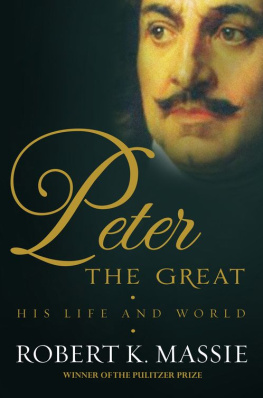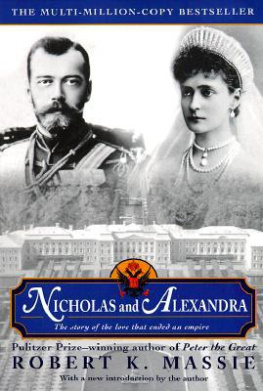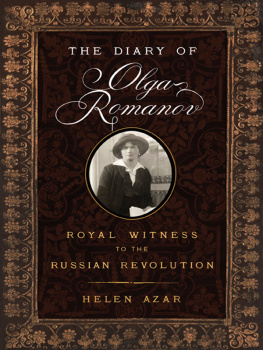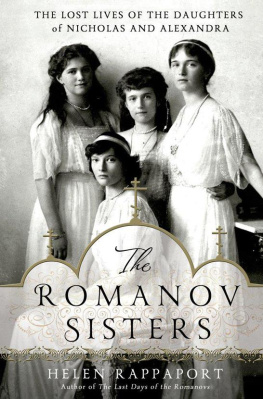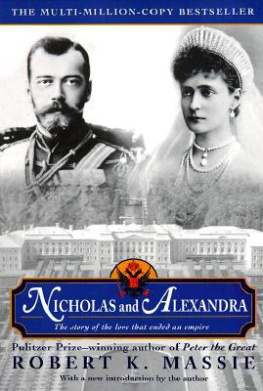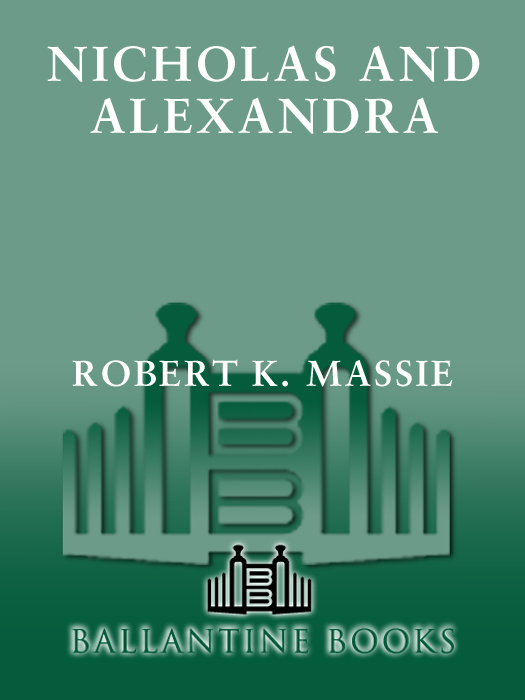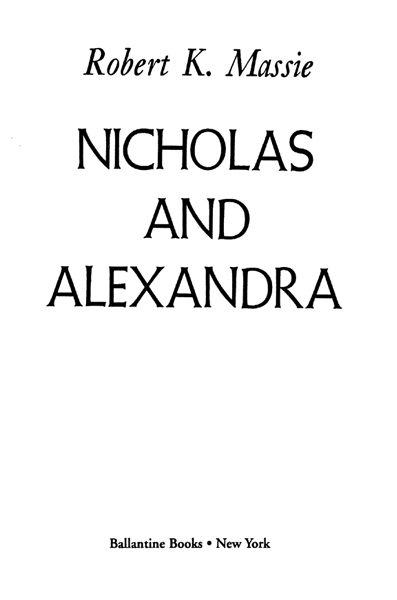A Ballantine Book
Published by The Random House Publishing Group
Copyright 1967 by Robert K. Massie
Copyright renewed 1995 by Robert K. Massi
Introduction copyright 2000 by Robert K. Massie
Excerpt from Catherine the Great copyright 2011 by Robert K. Massie.
All rights reserved.
Published in the United States by Ballantine Books, an imprint of The Random House Publishing Group, a division of Random House, Inc., New York, and simultaneously in Canada by Random House of Canada Limited, Toronto. Originally published by Atheneum Publishers in 1967.
Ballantine and colophon are registered trademarks of Random House, Inc.
www.ballantinebooks.com
Cataloging-in-Publication Data is available upon request from the Library of Congress.
This book contains an excerpt from Catherine the Great by Robert K. Massie. This excerpt has been set for this edition only and may not reflect the final content of the forthcoming book.
eISBN: 978-0-307-78847-4
v3.1_r1
More praise for Nicholas and Alexandra
Massies history covers two terrible decades in European history and re-creates the doomed Romanovs with admirable clarity. He puts the obscene Rasputin goings-on into the context of the Romanov courtfatally rooted in the half-barbaric system of old Muscovy.
Time
Massie embarked on the task because, finding himself the father of a hemophilic son he became fascinated by the sad case of Tsarevich Alexis, the effects of this tragedy on the conduct of his parents, and the impact of Rasputin on the course of history.
The Observer (London)
Reads as lightly as a novel, as authoritatively as a textbook.
The Christian Science Monitor
A larger than life drama, so bizarre, so heartrending and, above all, so apocalyptic, that no novelist would have dared invent it.
Saturday Review Syndicate
Intimate history at its magnificent best.
Bestsellers
Also by Robert K. Massie
PETER THE GREAT
DREADNOUGHT
JOURNEY (coauthor)
THE ROMANOVS
CASTLES OF STEEL
I have a firm, an absolute conviction that the fate of Russiathat my own fate and that of my familyis in the hands of God who has placed me where I am. Whatever may happen to me, I shall bow to His will with the consciousness of never having had any thought other than that of serving the country which He has entrusted to me.
NICHOLAS II
After all, the nursery was the center of all Russias troubles.
SIR BERNARD PARES
The Empress refused to surrender to fate. She talked incessantly of the ignorance of the physicians. She turned towards religion, and her prayers were tainted with a certain hysteria. The stage was ready for the appearance of a miracle worker.
GRAND DUKE ALEXANDER
The illness of the Tsarevich cast its shadow over the whole of the concluding period of Tsar Nicholas IIs reign and alone can explain it. Without appearing to be, it was one of the main causes of his fall, for it made possible the phenomenon of Rasputin and resulted in the fatal isolation of the sovereigns who lived in a world apart, wholly absorbed in a tragic anxiety which had to be concealed from all eyes.
PIERRE GILLIARD,
Tutor of Tsarevich Alexis
Without Rasputin, there could have been no Lenin.
ALEXANDER KERENSKY
Introduction
W hen Nicholas and Alexandra was first published in 1967, the rule of Soviet-style communism in Russia seemed monolithic, implacable and eternal. I did not believe that I, or my children, or my childrens children, would ever see the fall of the Soviet system. And yet, so quickly that it was hard to keep track of what was happening, the monolith cracked, the Soviet Union dissolved, Leningrad became St. Petersburg, and the white, blue and red flag brought to Russia by Peter the Great replaced the red hammer and sickle banner floating over the Kremlin. Amidst the excitement and turmoil of looking to their future, Russians also began looking to their past. Russia, after all, has existed for a thousand years; the Soviet era lasted only seventy-four. The Romanov dynasty, which included such towering figures as Peter and Catherine the Great, had ruled for more than three centuries. It came to an end in brutal murders in a Siberian cellar, but many Russians never knew this had happened. Or how. Or why.
These were questions which also had interested me. I am an American and my interest in the life and reign of the last Tsar was that of an historianand a father. I was curious because these events in Russia had made a profound impact on the history of the twentieth century, during which I have lived most of my life. In addition, the birth with hemophilia of my oldest son gave the tragedy of Nicholas and Alexandra and their only son, Alexis, a personal meaning.
When I began to write this book, I had no preconceived political views. My purpose was not to blame or excuse, but to discover and explain. What I found was both fascinating and frustrating. There was general agreement that the hemophilia of the Tsarevich Alexis, the heir of the last Tsar of All the Russias, had been a significant factor in the personal and political lives of his parents and, because of their exalted position, in the fall of Imperial Russia. In an effort to deal with the agonies inflicted by hemophilia on her son, the distraught mother turned to Gregory Rasputin, the charismatic and dissolute Siberian mystagogue. Rasputins presence near the thronehis influence on the Empress and, through her, on her husband and the government of Russiahelped to speed the fall of the dynasty.
This was fascinating. But it was frustrating to find that even those who attached great importance to the effect of the disease on events could not explain, either in human or medical terms, exactly what happened. If the illness of this boy and the aid given him by Rasputin had, in fact, helped to bring down the ancient Romanov dynasty and led to the Russian Revolution, why had there never been an attempt to decipher and explain these episodes of grim suffering and dramatic healing? As for Rasputin, who had not heard something of this extraordinary man and his lurid murder? But who knew precisely what he did to help the Tsarevich? In both historical and human terms, it seemed to me that only by understanding the basis of this relationship did the rest of the story become coherent.
I read the diaries, letters and memoirs left by the men and women who were intimately involved in this great drama and found in them a wealth of fragmented information that had never been collected and structured. My purpose was to weave all the available threads together and to interpret, in the light of modern medicine and psychiatry, an account of a family whose struggle with a disease was to have momentous consequences for the world
If, at first, my interest was in tracing the role of the hemophilia, I soon found it expanding to include the whole rich panorama of the epoch and reign of Nicholas II. Half a century after the revolution, some Russian migrs still revered and idolized the last Tsar. Others continued to speak of him as the tyrant, Bloody Nicholas. Usually, however, he was described as shallow and weak, a two-dimensional figure presiding feebly over the last years of a corrupt and crumbling system. Historians admitted that Nicholas was a good manthe historical evidence of gentleness, charm, love of family, religious faith, sense of duty and strong Russian patriotism was too overwhelming to be denied. But personal characteristics are irrelevant, it was argued. What mattered was that Nicholas was a bad tsar.




